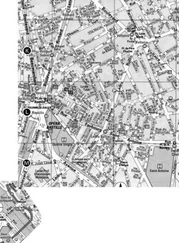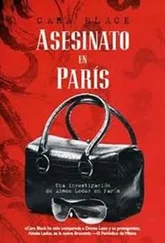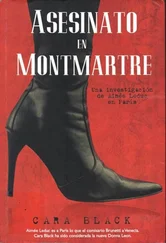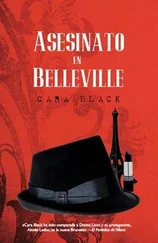On Square Berlioz cardboard boxes with old clothes and kitchen appliances stood waiting for the morning charity pickup. She took off her coat, rooted through the boxes, and found a jacket. A button was missing, the satin lining torn, but she didn’t need to see a label to know it was haute couture . Balenciaga. Worth thousands of francs, if you could even find one, at a vintage shop.
She slipped it on, left her coat in its place, walked a block, and mingled with the crowds streaming out of the cinéma in Place de Clichy. Earnest discussions of Godard’s symbolism and Bertolucci’s directing style buzzed around her.
The mec Jacky from nearby Académie de Billard couldn’t be far behind. She had to act fast. She grabbed the free alternative paper piled in the cinema lobby and bought a ticket for the next film, Elevator to the Gallows, the black and white Louis Malle classic with Jeanne Moreau decked out in pointy pumps and heavy eyeliner, smoking endless cigarettes and beelining for the bad boy.
Pretty much like Aimée, except for the cigarettes and heavy eyeliner.
During the opening credits, Aimée sank down in her seat with her pen flashlight and scanned the club listings in the alternative newspaper. Under HEAVY METAL she found one club in the 17th featuring a Goth band. But searching under FUSION she found the listing she wanted.
Metallomix, Mado’s band, was playing at Lush, a former electric power station, a few streets away. Aimée looked at her watch. Metallomix’s set began in an hour. Time enough to watch Jeanne Moreau’s lover-thief stranded in the elevator, aghast at his perfect crime undone due to a minor unforeseen detail.
The little things, she thought. Check and recheck, her father had always said. What detail was she was missing?
She watched the movie, waiting for time to pass.
Out in the lobby, she tried Gassot’s number again. This time someone answered.
“ Oui,” he said.
“Can I speak with Gassot?”
“We’re a café, not a message center.”
“But this is the only number I have for him,” she said.
“I haven’t seen him,” he said.
“I’ll call back.”
She made her way to the club, keeping to the unlit side of the cobbled street. Lush might live up to its name on other nights, Aimée thought. It boasted alternative nights of raï, reggae, jungle, techno, R&B, and tango, but this late evening crowd of semi-heavy metal and Rastas, interspersed with media types, spoke to the mixte life of the quartier .
And she, with her torn black fishnet stockings, Balenciaga jacket, and Moroccan shirt, would fit right in. Nouvelle slut.
Lush felt more louche than metallic, the type of place clubbers went after leaving Pink Platinum, a techno striptease, or else en route to a squat-club in an old theatre.
There were DJs on several floors and sofas and harem style rooms with net curtains and canopies over the alcoves for privacy. Inside the old metal-framed glassed-in industrial space, billowing gauze in pastel colors separated the areas. A curtain of metallic pebbled blue lurex material beckoned dancers to lean into it: shimmering and seductive. On the right were low tables and pillows with model-types, assorted rock royalty, and a well-known aging rocker in leather pants, sipping mint tea.
“How old am I?” she overheard him saying to one of the models. “I’m eighteen. The rest is experience.”
She found elbow space at the end of the bar, ordered a glass of mineral water with lime, and eyed the stage on the main floor. Mado’s set should start soon.
“Come here often?” asked a voice next to her.
She grasped her glass, reached for the bartender’s knife, and turned.
Pleyet stood next to her, holding a beer. The smoke and hanging blue halogen lights didn’t obscure his eyes: cold and expressionless. Not even a blink. A jagged scar was visible along the hairline of his temple. She doubted it came from a face-lift; more likely a machete.
“I like the band,” she said.
“You would,” he said.
“I guess Charles Aznavour’s more your style.”
He shrugged. “This is music?”
The twang of a sitar, accompanied by a curious mélange of mandolin and oboe, pulsed in the background. The wide dance floor filled up and a sweet spice scent of sandalwood wafted from the corners.
“You might want to let go of the knife,” he said, pointing to the bartender who was scratching his head and muttering. “Looks like he needs it.”
“Pardon,” she said, setting it back on the bar.
She wondered if Pleyet had followed her or had come to question Mado. But it only made sense for him to reveal himself if he wanted something.
“Think back to the Place Vendôme affair. Remember the surveillance firm your team contracted with?” she said. “That was me. The little explosion in the Place Vendôme? Well, that was my father. Remember?”
In the pause she could hear rain splattering on the skylight overhead.
“I know,” he said.
“That’s all you have to say?”
He waved his hand with a dismissive gesture. He rocked on his heels, staring at her.
At least he’d admitted it. They were making headway.
“I had nothing to do with your father’s death,” he said. “Our team dealt with security. The rest—” He looked down. “They contracted with firms like yours so if it blew up in their faces, as it did, nothing would be traceable to the Ministry. That’s all I know.”
“I want names,” she said. “Department chiefs. Anyone responsible.”
“Let it go,” he told her.
“People have said that to me for years.”
“We were peons, workers. The whole unit was disbanded afterward. Now another Ministry handles ‘sensitive’ issues. All new faces. And the ones who left? You know how fonction-naires lose their files and can’t recollect conversations? All their documents have been shredded, all memories erased.”
She knew what he meant. And it was probably true. But that didn’t mean she could accept coming to a dead end in investigating her father’s death.
“What’s that phrase, Pleyet, ‘Lay your cards on the table.’ Then we might do business,” she said. “But then according to you, you’re not in business and you’re not RG.”
He shrugged. “Brands and labels,” he said as if she referred to items on the supermarket shelf.
He didn’t meet her eyes. The band’s shaved-headed drummer was tapping his snare drums, doing a sound check.
“What’s your connection to Regnier? He’s on suspension.”
For the first time he blinked. “Since you know so much, are you aware that he’s under surveillance?”
“So that’s it,” she said. “You are the Circle Line . . . . Why do you want the jade?”
“You still have no manners,” he interrupted.
“Did that strike a chord?“ She’d make it simple. “Pleyet, you’re out of place here; you stick out,” she said. “But I can help you.”
“Out of the goodness of your heart?”
“We can help each other.”
The old zinc counter vibrated under her fingers from the music. How much should she reveal to Pleyet? Wouldn’t he use her and move on? Special Ops, the Circle Line, they were ruthless. And the suspicion that he’d had a hand in her father’s death hadn’t gone away.
But she might be able to barter her information for a detail or name.
She remembered Linh’s words . . . how her actions were monitored and her family under surveillance. When Aimée had accosted Pleyet in the café she’d understood why he’d brushed her off; he was afraid she’d blow his cover. But now he’d approached her. She had to find out why he wanted the jade, and for whom.
Читать дальше











